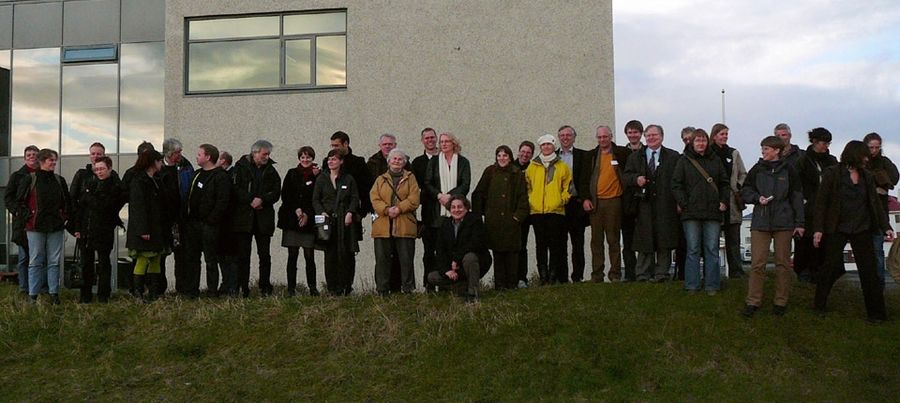In the wake of the big one
In the build-up to the Frankfurt Book Fair 2011, demand for translators increased exponentially. Richard Kölbl never had any time off, but he's not complaining.
It is easy to overlook the crucial role that translators play in the cultural life of a small country. Without their efforts, Iceland's literature would be confined to the few hundred thousand souls who understand Icelandic. It should therefore come as small surprise that in the build-up to the Frankfurt Book Fair 2011, where Iceland was Guest of Honour with all the cultural exposure that entails, demand for translators increased exponentially. As German publishers clamoured to have a healthy catalogue of Icelandic works ready for the occasion, the relatively small group of Icelandic-to-German translators suddenly faced a tidal wave of sagas, poetry, plays, children's books, novels, anything, waiting to be translated. This, they realized, was the big one. This was the mother lode.
Translator Richard Kölbl, whose body of work encompasses a panorama of genres and forms, was one of these overworked few. “All of the work was enjoyable,” he tells us, “but three projects stood out especially. First, Hermann Stefánsson's novel Algleymi (lit. Oblivion) is one of the best books I've read. My German translation of it was published last year by a small publishing house named Litteraturverlag Roland Hoffmann, and received a fine reception. Then there was the Icelandic poetry anthology published by Suhrkamp, which spanned a huge time period, from Viking era poet Egill Skallagrímsson to contemporary poets. Finally, the three Icelandic plays I translated, by Bragi Ólafsson. Jón Atli Jónasson and Sigtryggur Magnason, all of which appeared together in a volume published by Henschel Schauspiel. One these, The Deep by Jón Atli, is due to be produced in Berlin. Working in all these different forms was very enjoyable, and introduced a lot of variety into my work. The poetry translations, though, were a special delight, and I'm proud of them, because they required me to to delve equally deep into the Icelandic and German language.”
Richard's poetry translations were not confined to the aforementioned Suhrkamp anthology. At a press conference at the Frankfurt Book Fair 2011, Jón Gnarr, mayor of Reykjavík, recited the poem Jesus Christ and I by Vilhjálmur frá Skáholti, in Kölbl's German translation.
We asked Kölbl if things were quieter now than a year ago. “A bit quieter, yes, but only because last year was completely bonkers. The demand for translations from Icelandic into German never let up. I always thought this would be a temporary thing, but that turned out to be a vain hope,” he says, laughing. “I never had any time off.”
Knee-deep in a documentary
 He tells us that his most current project was inspired by a visit to Hali, the birthplace of eccentric literary light Þórbergur Þórðarson and now a museum and cultural centre devoted to the author. Richard had occasion to visit Hali for a translator's conference organized by Sagenhaftes Island in 2009, when Iceland's Guest of Honour initiative was in its infancy. A large number of translators was invited to the event, at which such luminaries as Pétur Gunnarsson and Soffía Auður Birgisdóttir gave talks on Þórbergur's life and work.
He tells us that his most current project was inspired by a visit to Hali, the birthplace of eccentric literary light Þórbergur Þórðarson and now a museum and cultural centre devoted to the author. Richard had occasion to visit Hali for a translator's conference organized by Sagenhaftes Island in 2009, when Iceland's Guest of Honour initiative was in its infancy. A large number of translators was invited to the event, at which such luminaries as Pétur Gunnarsson and Soffía Auður Birgisdóttir gave talks on Þórbergur's life and work.
Since then, Richard has been fascinated with the gifted but decidedly oddball Þórbergur, and is know knee-deep in the production of a documentary on him. During the course of this work, he has amassed a glut of material and published articles on Þórbergur, and when we met him, Richard happened to be en-route to a secondhand bookstore to secure works by Þórbergur he was still missing. On a related note, last year marked the publication of the first work of Þórbergur to be published in German, Íslenskur aðall (lit. Icelandic Gentry), translated by Kristof Magnússon and published by S. Fischer Verlage.
Richard feels that awareness of Iceland and Icelandic literature has increased in Germany. “I don't have any numbers to back it up, but I feel that the idea of Iceland is now closer to the surface in the German consciousness. It's remarkable that one never hears anything negative about Iceland. Germans find Iceland fascinating and exotic, but there's also a lot about the country they don't realize. How expensive it is to be an Icelander, for instance – the cost of being such a small country that nevertheless has to maintain all basic services and infrastructure. I'd like to write an article on Iceland that would widen Germans' perspective on Icelanders and demystify the subject.”
This time around, Richard isn't stopping over in Iceland for long, but he'll return soon enough. “It's satisfying to see the results of the [Sagenhaftes Island] project. The collaboration between Iceland and Germany went swimmingly, and Icelandic literature is cruising along now, sometimes quite literally: I took the sea route to Iceland recently, and during my time onboard I came across many Germans reading fresh translations of Icelandic literature. That was gratifying!”